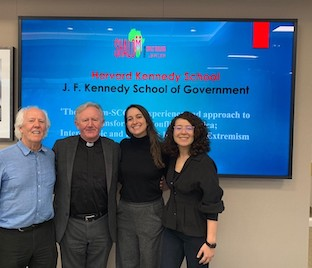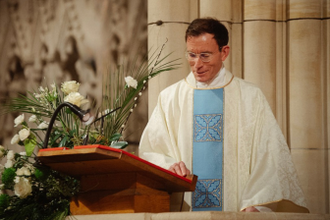Shalom Chairman delivers lecture at Harvard Kennedy School

Fr Patrick Devine with faculty members of Harvard Kennedy School
Founder and International Chairman of the Kenyan-based Shalom Center for Conflict Resolution and Reconciliation, Rev Dr Patrick Devine, travelled last week to the Harvard Kennedy School at the JF Kennedy School of Government in Cambridge, Massachusetts in the USA to deliver a lecture on "Inter-Ethnic and Religious Ideological Extremism: The Shalom Experience and Approach to Transforming Conflict in Africa."
The event was hosted by the Negotiation and Conflict Resolution Collaboratory at Harvard's Center for Public Leadership and was moderated by faculty member, Hugh O'Doherty. Dr Devine outlined the Shalom Center's vision, mission, perspectives and methodology in working towards a society free of physical violence and unjust social structures in Africa. A variety of issues and perspectives were discussed concerning the underlying causes of conflict and its persistence, conflict transformation and peace-building in Africa.
Discussions also focused on issues in the Middle-East, Ukraine/Eastern Europe, Northern Ireland, Asia-Pacific, non-violent extremism in democratic states and the strengths and weaknesses of international institutions in preventing and countering manifest and structural violence around the world.
UN data shows that conflict and violence are on the increase globally. More countries are experiencing violent conflict that at any time in almost 30 years. Over 1.6 million people worldwide lose their lives to violence each year. Violence is now one of the leading causes of death for people aged 15 - 44 years worldwide. It accounts for 14% of deaths among males and 7% of deaths among females. At the end of 2021, more than 450 million children - or one in six - were living in a conflict zone, the highest number in 20 years. A record 3.5 million children were displaced from their homes as a result of conflict, violence and other crises.
Conflict remains the primary driver of terrorism with more than 99% of all terrorist-related deaths occurring in countries involved in a violent conflict. Deprivation and unjust social structures can cause violent behavior that can spread quickly as experience shows.
Dr Devine explained to students and faculty members how the Shalom Center conducts rigorous research on the underlying causes of inter-ethnic conflicts and religious ideological extremism. "Our interventions to transform, to settle, to resolve and to reconcile conflict from manifest violence to negative peace initially and then onto positive peace focus on empowering grassroots local opinion-shapers to be the architects of their own independent future and reconciled co-existence. Due to appalling issues of gender violence in densely populated impoverished urban settlements (slums) we recently opened the "Shalom Empowerment Center addressing violence against Women and Children" in Nairobi. We have already seen the huge demand for the services we provide there", he said.
Attendees were very keen to hear how to date wide-ranging peace dividends have emerged from the organisation's conflict transformation-sustainable development interventions. He told them how "Shalom, in liaison with the local influential opinion-shapers who are trained in conflict transformation skills and peace-building techniques, have established, rehabilitated, or equipped a large number of inter-ethnic and inter-religious educational, medical, water and other inter-community development projects. Over 570 school development projects in 280 institutions in poor and marginalised conflict environments in Eastern Africa have been empowered by our conflict transformation interventions and funding. Many more are currently in process depending on the peace road-maps unfolding in conflict zones where Shalom works."
Harvard Kennedy School and Shalom are engaged in conversations concerning joint research projects and student/scholar collaboration on issues such as climate change and conflict and sustainable peace-building processes. Shalom has a highly qualified team pioneering conflict resolution and sustainable development work in conflict zones in Eastern Africa. It has a memorandum of understanding with a number of universities in the USA, Ireland and Northern Ireland.
Readers can meet Dr Devine in this short video: www.youtube.com/watch?v=N5bhL0Dpbi0.
Dr Devine last visited the Harvard Law School in 2016. He told me how important American support - financial and otherwise - remains for the extension and success of Shalom's pioneering work throughout Eastern Africa. Readers wishing to support that work can contact him at: https://shalomconflictcenter.org/.
Matt Moran is an Irish writer focusing on international development, faith and social issues. He recently published his second book - "The Theology of Integral Human Development: The Role of Faith in International Development & Public Affairs - that can be purchased at www.buythebook.ie.


















